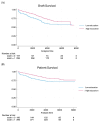Role of Educational Level in Kidney Transplant Outcomes
- PMID: 40299545
- PMCID: PMC12024966
- DOI: 10.3390/biomedicines13040916
Role of Educational Level in Kidney Transplant Outcomes
Abstract
Background: Kidney transplantation outcomes are correlated to many factors, including the socioeconomics conditions and the educational level. Methods: We evaluated the role of educational level on patient and graft survival in a population of 456 kidney transplant recipients. Patients were divided into two groups on the basis of their pre-transplant educational status: patients with primary education (elementary or middle school, as low education) were compared with patients with a secondary school education (high school or a university degree, as high education). Results: Among the 456 patients considered for this analysis, 161 patients had a low educational status, and 295 had a high educational status. Patients with a low educational status were more rarely employed (66.1% vs. 32.5%, p < 0.001), with a high rate of retired patients compared to high-educational status patients (35.6% vs. 10.6%, p < 0.001). Although the educational status did not influence the graft function, the 1-year (88.1% vs. 96.2%, p = 0.0008), 5-year (77.6% vs. 88.8%, p = 0.001), and 10-year (62.1% vs. 75%, p = 0.003) graft survival rates were significantly lower in patients with low educational status compared with high-educational status patients, respectively. Patient survival at 1-year (94.4% vs. 97.6%, p = 0.073), 5-year (85% vs. 92.5%, p = 0.011), and 10-year (75.7% vs. 83.4%, p = 0.042) follow-up was significantly lower in patients with low educational status. Conclusions: Low socioeconomic conditions and educational level had a negative impact on kidney transplant outcomes. Improving access to education and providing targeted educational support and health literacy could enhance treatment adherence and reduce disparities in transplant outcomes.
Keywords: deceased donor; educational status; employment; graft survival; income; kidney transplantation; living donor; patient survival; quality of life; socioeconomic conditions; work.
Conflict of interest statement
The authors declare no conflicts of interest.
Figures
References
-
- Nielsen-Bohlman L., Panzer A.M., Kindig D.A. Health Literacy: A Prescription to End Confusion. Committee on Health Literacy, Board on Neuroscience and Behavioral Health, National Academies Press; Washington, DC, USA: 2004. - PubMed
-
- Salter M.L., Orandi B., McAdams-DeMarco M.A., Law A., Meoni L.A., Jaar B.G., Sozio S.M., Kao W.H., Parekh R.S., Segev D.L. Patient- and provider-reported information about transplantation and subsequent waitlisting. J. Am. Soc. Nephrol. 2014;25:2871–2877. doi: 10.1681/ASN.2013121298. - DOI - PMC - PubMed
LinkOut - more resources
Full Text Sources


